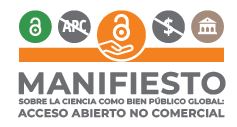Socioproductive projects: alternative for endogenous development from educational institutions
DOI:
https://doi.org/10.5281/zenodo.13975365Keywords:
Socio-productive projects, endogenous development, general secondary education, stable groupsAbstract
This article reviews the results of the research that had the purpose of proposing the implementation of socio-productive projects as an alternative for endogenous development from the Galanda Rojas de Contreras Educational Unit, located in the Pueblo Nuevo parish, Baralt municipality, Zulia state. The methodology included a feasible project, field design, non-experimental, transectional. The population consists of 12 teachers and 64 students. Data were collected through a questionnaire, validated by experts and reliability 0.8912. It was concluded that the respondents have empirical knowledge about the cultivation of different crops, such as school gardens or in isolated pots, but they lack knowledge about different cultivation methods that make it easier for them to harvest vegetables. It was necessary to offer alternatives to the population of the aforementioned institution, on how to take advantage of idle spaces, available and suitable for cultivation. It was determined that socio-productive projects are generally agricultural.
Downloads
References
Artesi, M. y Zárate, L. (2019). Desarrollo endógeno. Bruguera.
Biblioteca Verde (2019). Desarrollo sustentable. UMED.
Caldart, R. (2021). Diccionario de educación del campo. Expresión Popular.
Cañasto, M. (2020). Ordenando y analizando sobre proyectos sociocomunitarios productivos. Escuela Superior de Formación de Maestros Simón Bolívar
Ciara, F. (2021). Manual de agricultura urbana. Popular.
Díaz, F. y Hernández, R. (2020). Estrategias docentes para un aprendizaje significativo. Mc Graw Hill
Fondo Intergubernamental para la Descentralización (2019). Modelo productivo ecosocialista. Papeles de trabajo.
Freire, P. (2019). Pedagogía del oprimido. Siglo XXI.
Gutiérrez, A. (2019). Diseño de un programa para la planificación de proyectos socioproductivos (Tesis de Maestría). Universidad Nacional Experimental Rómulo Gallegos. San Juan de los Morros
Gutiérrez, C. (2022). Desarrollo endógeno. Avances en América Latina. UNESCO.
Greenbowe, F. (2021). Participación ciudadana. Síntesis.
Méndez, T. (2022). Manual de participación para facilitadores. Ecoe.
Mc Kernan, A. (2021). Pedagogía crítica. Deustro.
Merino, M. (2019). La participación ciudadana en la democracia. Universidad Complutense de Madrid.
Ministerio del Poder Popular para el Desarrollo Social (2020). Proyectos socioproductivos.
Ministerio del Poder Popular para la Educación (2008). Planes y programas.
Molina, L. (2023). Cooperativismo. CEPAL.
Moreno, D. (2019). Manual de agricultura urbana. Fondo de Cultura Económica.
Muñoz, N. (2022). Aportes para la reflexión en torno a la intervención en trabajo social. Universidad de Medellín.
Osland, D. (2019). El desarrollo sostenible como eje fundamental de la educación ambiental. UNED.
Proyecto INTA (2020). Cultivos hidropónicos.
Romero, T. (2022). Proyectos socioproductivos para el fortalecimiento del desarrollo endógeno. (Tesis de Maestría) Universidad de Oriente. Ciudad Bolívar
Santagata, R. (2019). Paradigmas del desarrollo. Horsori.
Schön, C. (2019). Trabajo colaborativo en la escuela. CEPAL.
Schoenfeld, A. (2019). Psicología del aprendizaje. Anaya.
UMATA (2021). Definición de patios productivos. Alcaldía de Cartagena.
Urcola, M. (2019). Estrategias socioproductivas y agricultura familiar. Intermediación.
Vázquez, A. (2019). Desarrollo endógeno, desarrollo local. Cinterfor.
Published
How to Cite
Issue
Section
License
Copyright (c) 2024 Universidad Alonso de Ojeda

This work is licensed under a Creative Commons Attribution-NonCommercial-ShareAlike 4.0 International License.
All content of Ethos Journal will be free access, distributed under the Creative Commons license (BY-NC-SA).




